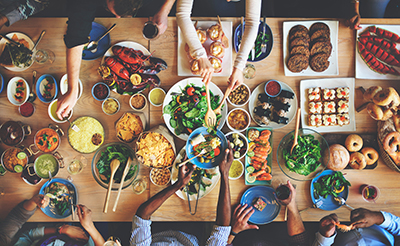Eating Better Through Mindfulness
Hunger is the voice of our biology. But biology can be deceiving and sometimes, we can’t depend on our feeling of fullness to stop eating. Our levels of leptin—the satiety hormone—depend on several factors, one of which can be genetics; but remarkably, these levels don’t change immediately after eating.
In 2019, 40% of the adult population aged 18 to 74 in Quebec had a waist circumference that was considered by the World Health Organization as being at risk in terms of heart disease, hypertension, or type 2 diabetes. An incredible 2.3 million adults were subject to abdominal obesity, which is twice as many as in 1990. Without intervention, the life expectancy of these individuals will be reduced by several years. But we cannot presume that so many people have poor judgment. This situation may be due to the eccentric behaviour of our
signaling system, which can give us the impression that our stomach is a bottomless pit. Eating too quickly is another way to exacerbate this issue, as we are more likely to eat excessively before we start feeling full. Overeating is yet another problem, as the stomach extends and as a result, the body will need more food before the feeling of satiety can be perceived.
 As you can deduce, we should not wait until we actually feel full to stop eating. We have the ability to determine which meals we should consume, and in what quantities, before we even sit down at the table. And we should stick to our decision. This voluntary approach will not only allow us to eat the appropriate amount, but also to eat a balanced meal.
As you can deduce, we should not wait until we actually feel full to stop eating. We have the ability to determine which meals we should consume, and in what quantities, before we even sit down at the table. And we should stick to our decision. This voluntary approach will not only allow us to eat the appropriate amount, but also to eat a balanced meal.
For several years now, I have been giving mindfulness training courses. As far as I am concerned, mealtime is an integral part of practicing mindfulness, just as any other moment of the day. Mindfulness also requires knowledge. In this case, it is necessary to know that leptin, the satiety hormone, needs time to come into play. It is therefore essential to rely upon your planned meal and to base your decision to eat based on sensible reasoning rather than sensorial indicators. Be cautious when your stomach is speaking to you. Often, during meals, my stomach tells me: “Eat more; I’m hungry”, until the moment when it suddenly changes its tune and says: “Oh, you’re stuffing yourself, it is too much!” The stomach is not used to communicating “I am pleasantly full now, you can stop.” It’s the voice of mindfulness which tells me that. Thankfully, our inner voice is powerful and it can drive our will to maintain a healthy weight. It can contribute to the comfortable sensation we feel when we have eaten well, and eaten enough, instead of feeling heavy after a meal.
Furthermore, mindfulness is also necessary when shopping for groceries. We must find our own way to overcome unhealthy habits, as well as self-serving commercial interests promoting unhealthy food choices. Today, an average supermarket carries an astonishing range of more than 40,000 items; so, more than ever, it is essential to be smart when we are selecting our food. Unlike the ancient tribal societies, where everybody had the same basic diet, our dietary choices have become extremely vast. We need more than basic knowledge to navigate through supermarket aisles, which are full of temptations, carefully stacked upon each other. Doing the groceries conscientiously involves careful reading of product labels and ingredient lists. Whereas the front of the product packaging contains the advertising messages, the back contains all the crucial details for your health, which are often in fine print. These are worth some extra attention—perhaps even some research—to better understand how these ingredients impact our health.
 Doing the groceries conscientiously also means prioritizing seasonal, locally grown, and organic products. At local markets, you can find products that are less processed and generally have a better nutritional profile. By shopping there, you are also contributing to the welfare of your local community and promoting sustainable farming.
Doing the groceries conscientiously also means prioritizing seasonal, locally grown, and organic products. At local markets, you can find products that are less processed and generally have a better nutritional profile. By shopping there, you are also contributing to the welfare of your local community and promoting sustainable farming.
Lastly, we need to be mindful of nutritional shortages and a need for supplementation. I learned this the hard way, having to endure 3 painful gum surgeries before realizing that coenzyme Q10 supplementation is helpful in maintaining healthy gums. I have been taking it now for 15 years and don’t suffer with gum issues anymore. CoQ10 is one of the half-dozen supplements that I take regularly, including omega 3, vitamin C, and during the winter season, vitamin D. Taking supplements is necessary for several reasons: The lack of sunlight during winter, agricultural practices which deplete the soil—and therefore crops—of their nutritional value, as well as the changing needs of our bodies, amongst others.
Whether it is at your dinner table or while shopping in stores, mindfulness is a simple tool to help you eat and live better.
 Joseph Emet
Joseph Emet
Joseph teaches meditation and mindfulness. He has written two books published by Le Jour: En Pyjama avec Bouddha prefaced by Thich Nhat Hanh, and Sourire comme Bouddha.
pleineconscience.ca

 Stores
Stores